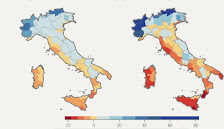Climate Change in Southern Italy: Impact and Response
Southern Italy is one of the most vulnerable regions of Europe to climate change. The region is already experiencing the effects of climate change, including rising temperatures, more extreme weather events and changes in rainfall patterns. These changes have a significant impact on the environment, economy and society of the region.
Impact on the environment
Climate change has a number of negative consequences for the environment of Southern Italy. These influences include:
Rising temperatures: Temperatures in southern Italy have been rising for decades. This warming trend is expected to continue, with average temperatures rising by 2-3 degrees Celsius by the end of the century. Rising temperatures are already having a number of impacts on the region's environment, including:
Melting glaciers: Glaciers in the Alps are melting at an alarming rate. This causes a decrease in the amount of fresh water available for drinking, irrigation and hydroelectric power generation.
More extreme weather events: Southern Italy experiences more frequent and severe heat waves, droughts, floods and forest fires. These events cause damage to property, infrastructure and crops.
Changes in the world of plants and animals: climate change causes changes in the distribution and abundance of plant and animal species. This disrupts the ecosystems and food chains of the region.
Changes in rainfall patterns: Southern Italy's rainfall patterns are becoming increasingly erratic. This leads to more frequent and intense droughts and floods. Droughts damage crops and livestock, while floods damage property and infrastructure.
Impact on the economy
Climate change is also having a negative impact on the economy of Southern Italy. The economy of the region is largely dependent on agriculture, tourism and fishing. All these sectors are affected by climate change.
Agriculture: Agriculture is one of the most important sectors of the economy of Southern Italy. However, climate change is making it harder for farmers to grow crops. Droughts, floods and heat waves damage crops and reduce yields. This leads to losses for farmers and higher food prices for consumers.
Tourism: Tourism is another important sector of the economy of Southern Italy. However, climate change is making the region less attractive to tourists. Rising temperatures, more extreme weather events and changes in rainfall patterns make visiting Southern Italy less enjoyable. This leads to losses for businesses in the tourism sector.
Fishing: Fishing is another important sector of the economy of Southern Italy. However, climate change is making it harder for fishermen to catch fish. Changes in ocean temperature and acidity disrupt fish populations. This leads to losses for fishermen and higher seafood prices for consumers.
Impact on society
Climate change is also having a negative impact on the society of Southern Italy. A large number of elderly people and people with chronic diseases live in the region. These groups are particularly vulnerable to the effects of climate change.
Health: Climate change increases the risk of heat-related illnesses, respiratory problems and other health problems. This creates a burden on the health care system of the region.
Social cohesion: Climate change also leads to social problems such as displacement, conflict and poverty. This makes life and work difficult for people in southern Italy.
Response to climate change
The governments of Italy and the European Union are taking a number of measures to address climate change. These steps include:
Reducing greenhouse gas emissions: Italy has committed to reducing its greenhouse gas emissions by 40% by 2030. The government is investing in renewable energy, energy efficiency and other measures to reduce emissions.
Adaptation to the effects of climate change: The Italian government is also investing in measures to adapt to the effects of climate change. These measures include building sea walls to protect coastal communities from flooding, growing drought-tolerant crops and improving early warning systems for extreme weather events.
Conclusion
Climate change is a serious threat to Southern Italy. The region is already experiencing the effects of climate change, and these effects are expected to become more severe in the future. The governments of Italy and the European Union are taking a number of measures to tackle climate change, but more needs to be done. Individuals can also play a role by reducing their own carbon footprint and supporting policies to combat climate change.




Comments
Post a Comment